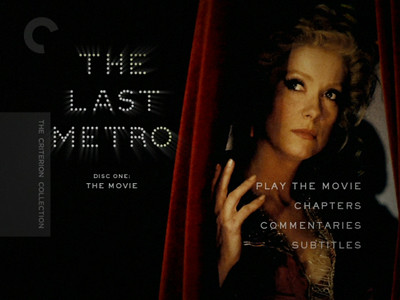
It's funny that we never actually see the Parisian subway at any point in Francois Truffaut's 1980 film The Last Metro, because it's the subway that the title refers to. As we are told in the spirited voiceover at the start of the picture, the last metro is specifically the last train that runs before the Nazi-imposed curfew in occupied France. If you don't catch that one, you're stuck wherever you are for the night whether it's safe to be there or not.
The significance of this is fairly obvious. Whether we see anyone on the train or not--and it is actually mentioned more than once--Truffaut's cast are stuck between two defining choices: either live life as if time really is about to run out, or carry on as if there will always be another chance, another train to come along when you need it. It also suggests that one can get out or stay, flee or hunker down. And, of course, the subway is underground, true freedom is in hiding.
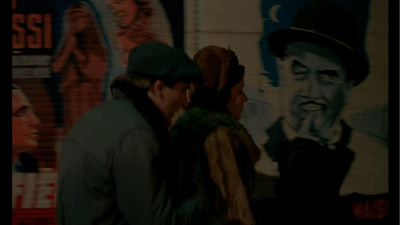
Truffaut, along with co-writer Suzanne Schiffman, have trained their spotlight on a theatrical troupe preparing a new production to amuse the downtrodden Parisians looking for a temporary escape through entertainment. Their theatre is famed for the artistic hand of its founder and director, Lucas Steiner (Heinz Bennent), a Jew who is believed to have fled to South America before the Germans came barreling in. This left his wife, Marion (Catherine Deneuve), to run the show, and with the help of Lucas' directing partner, Jean-Loup (Jean Poiret), they are going to helm a new play, Disappearance, using the notes left behind by Lucas, who also wrote the script under a pseudonym. Little does the rest of the cast know, however, that Marion, a former film star now strutting the boards, is hiding her husband in the cellar under the stage. He never left the country and hasn't really surrendered his director's chair, either.
This is just one of the many secrets in The Last Metro, a film in which the term "duplicity" is less of pejorative and more of a means of survival. Everything must have a double meaning, everyone a double role. Lucas has adopted the guise of a Norwegian woman to write Disappearance, and the double meaning of his play-within-the-film will serve as commentary on his own plight. Likewise, all the actors have the two faces they wear, the on-stage and off-stage personas. Some, such as the homosexual Jean-Loup and the lesbian costume designer Arlette (Andrea Ferreol), are also hiding their sexuality, their true personalities sublimated to the rule of law. Just as, of course, there is occupied France and Vichy France, though really only one France at its heart.
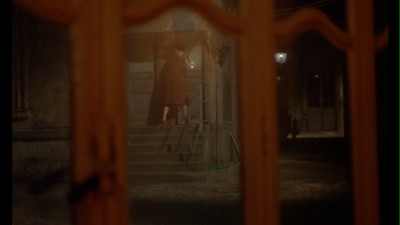
And then, of course, there will be the two men in Marion's life. In addition to Lucas, a new actor has joined the company to play the male lead in Disappearance. Bernard Granger, appropriately played by a virile and physically forceful Gerard Depardieu (in the film, he is compared to Jean Gabin in Le Bête humaine), has come to them from the Grand Guignol, the theatre renowned for its bloody horrors. It's fitting, given the horrors that rage all around them, that he'd want to get away from the blood and guts. Beneath Granger's disarming exterior, however, is a sensitive actor and a passionate man who balances a love for performance with a love of country. His secret life is being part of the Resistance.
The Last Metro follows the acting company through rehearsals to the initial stagings of their play, chronicling the personal mishaps and the political obstacles they must endure to keep their lives rolling forward. Someone is always watching, and it's not always someone who bought a ticket. Getting panty hose is no less difficult nor less important than Marion's continued efforts to get Lucas to free territory. Jean-Loup must make diplomatic connections and shake hands with the enemy, including an egotistical, anti-Semitic theatre critic (Jean-Louis Richard), in order to keep the stage lights lit--and eventually, he pays his own price for this limited collaboration. Then again, many have to get by any way they can. The young actress Nadine (Sabine Haudepin) takes any part she can get, regardless of what it means to her self-esteem or reputation. Likewise, Bernard must harness some of his more violent impulses for the greater good, a mission he is not always successful at completing.
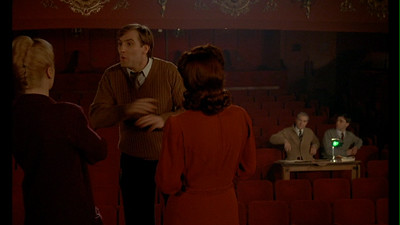
Amongst this, Bernard and Marion must also keep their romantic impulses under control, a situation that Truffaut hints at throughout The Last Metro, but a development that he perhaps plays too close to the vest. Yes, there are glances shared, and even more unseen looks from Bernard to Marion that suggest something more is going on with him, but to be honest, when love emerges in the third act, it does seem a little tacked on. I would guess this is something Truffaut realized himself, and thus he plays with the notion of the film's own staginess in The Last Metro's epilogue, where he kind of turns the whole thing in on itself. Even so, this clever wink plays like an afterthought rather than something we should have expected all along.
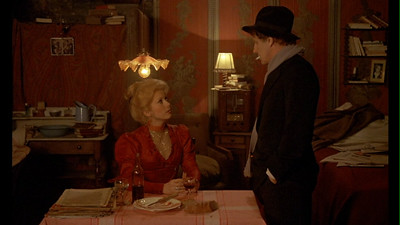
That's really the only complaint I can muster for The Last Metro, though. Outside of that, the movie is an expertly crafted, multi-layered drama. It critiques without proselytizing, philosophizes in a matter-of-fact manner, and shows character through action rather than explanation. In that sense, seeing how well his less-is-more approach works for him through the rest of the picture, one can't fault Truffaut too much for not seeing when he maybe went too far with it.
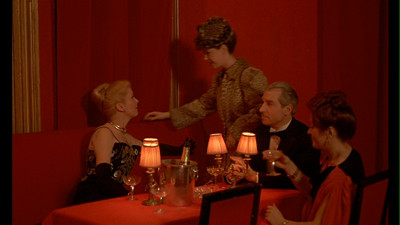
Most of the film's action takes place inside the theatre, and Truffaut and production designer Jean-Pierre Kohut-Svelko create an elaborate world within, complete with its own class structure. The untouchable is hidden in the basement, the ruler lives in the uppermost tier, and on the ground, everyone is equalized. The stage is the thing, and Truffaut peels back the curtain to show us the theatrical world the way he bent the screen to give us a peek at movies in Day For Night. (Point of fact, there was to be a third film about music hall that would create a trilogy of sorts, Truffaut's portrait of the entertainment world, but it never came to fruition.) Again, it's a picture inside a picture: the theatre being a fictional world within occupied France, that part of France being a fictional structure within the whole of the country, France a part of the world, and on into the universe.
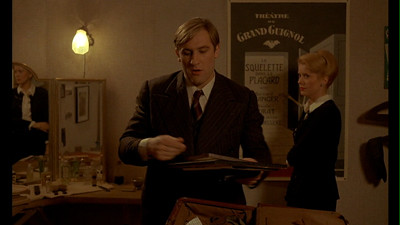
Clearly in love with his subject, Truffaut spares no indulgence in creating an almost surreal façade of 1940s Paris. Gorgeous theatrical posters dot the streets, and the stage sets in the theatre are painted in bright, beautiful colors. So, too, are the clothes of his actresses sparkling flowers in comparison to the drab uniforms of the Nazis. Catherine Deneuve, with her gorgeous and fiery hair, switches from the shocking red of her stage costume to the more dowdy uniform of a theatre owner. No surprise, then, that by comparison, Depardieu is always dressed more seriously, ready for whatever business necessary.
The greater romance, one could argue, is not between Marion and Bernard, but between art and its audience. If in troubling times all the Parisians had to lift their spirits was a night out at a play, then the players would continue to perform. Francois Truffaut is paying homage to the resilience of the entertainers, showing how the dedication to their craft was also a dedication to their people, whether it be the subversion of writing a meaningful play or being a secret member of the Resistance, or even just stepping out every night and putting on a show regardless of the threat. Or, hell, just having the foresight to make sure your show ended in time for your audience to get the final train of the evening. In the end, it was for the good of all of France, providing an alternative to accepting a ride on that last metro to God knows where.
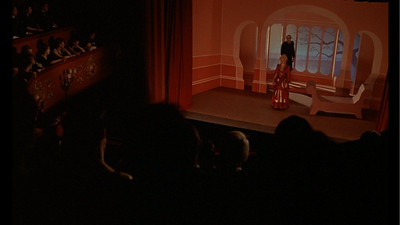
For a full rundown on the special features, read the full article at DVD Talk.

No comments:
Post a Comment